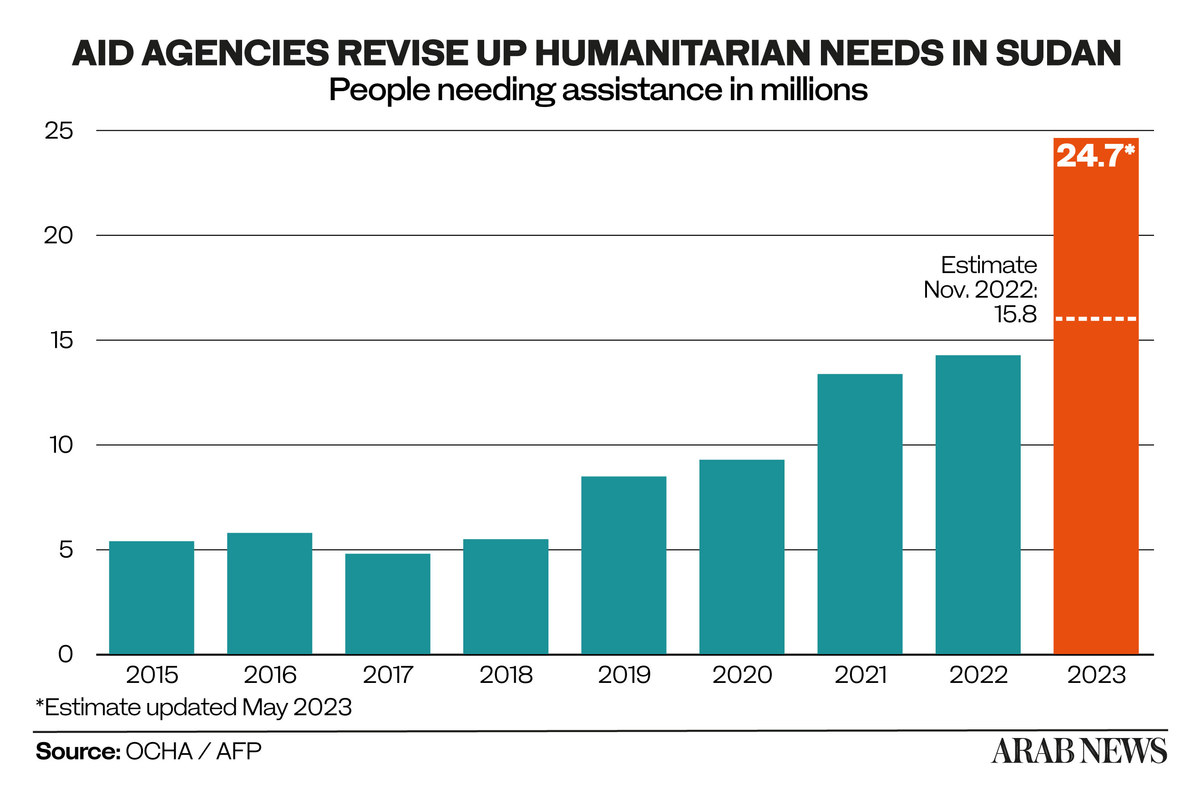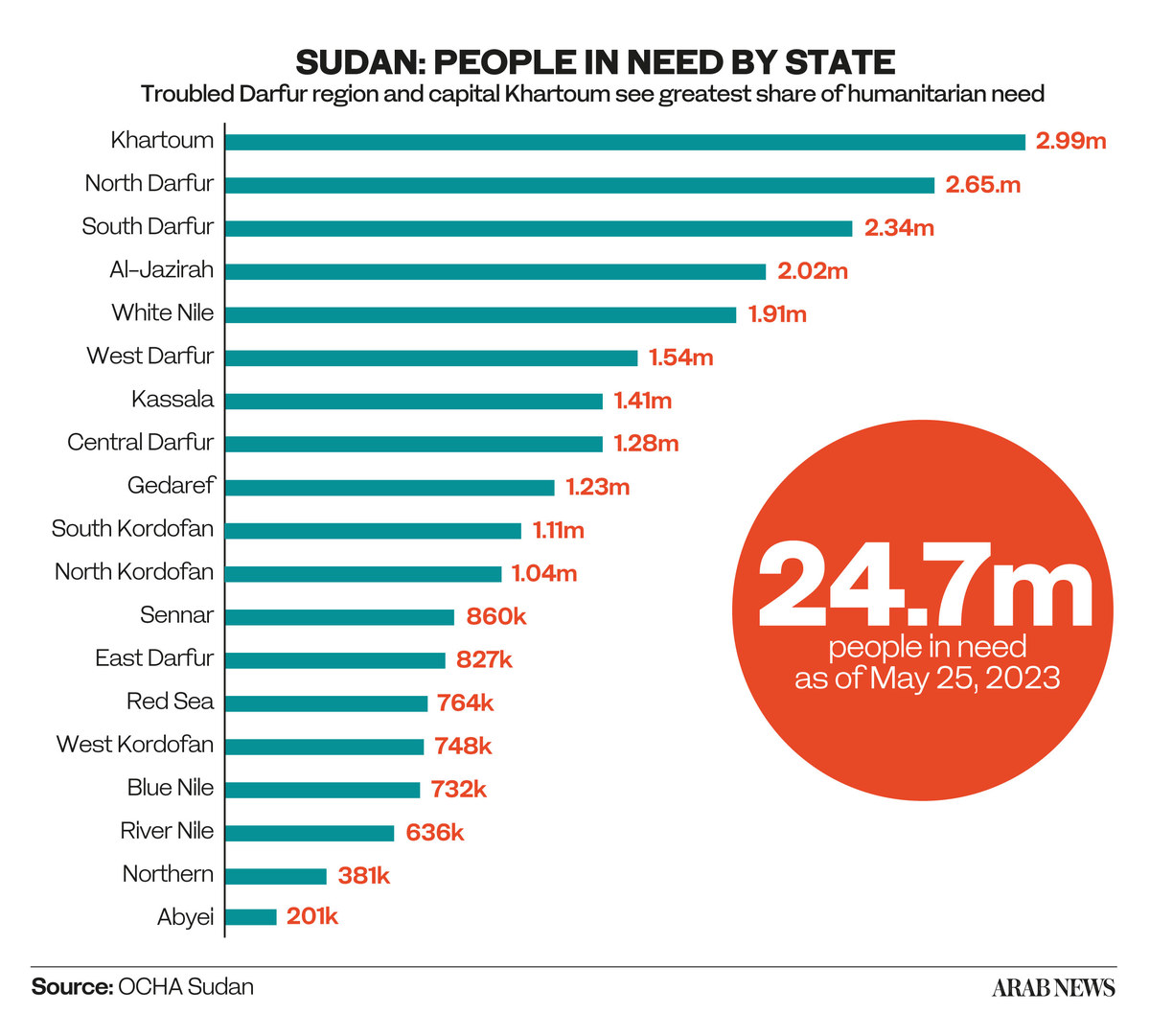JUBA: Several hundred African migrants and asylum seekers, including children, are stranded in a remote, militarized buffer zone at the Tunisia-Libya border, where they have been denied assistance or legal protection.
In this arid landscape, a humanitarian crisis is fast unfolding, as these people, fleeing violence and persecution in their home countries, including Sudan, have found themselves trapped in limbo, unable to enter Libya or return to Tunisia.
Videos posted online in recent days show hundreds of stranded adults and children without access to food, water, shelter, or medical assistance, as UN agencies have been denied access to the site to distribute aid.
Many of the migrants were apprehended in police raids in Tunisia’s port city of Sfax, southeast of the capital Tunis, and transported by the national guard and military over a distance of 300 kilometers to Ben Guerdane, and subsequently taken to the border with Libya.

Tensions had been rising in Sfax for several months, with residents calling for the expulsion of those arriving from trouble spots elsewhere on the African continent, resulting in a rash of attacks and clashes between locals and these new arrivals.
According to the UN, in addition to the more than 2.2 million internally displaced persons in Sudan, nearly 700,000 more have fled to neighboring countries. In a bid to reach Europe, some of them have made their way northwest to Libya and Tunisia.
“I came to Tunisia seeking safety, but instead, I found myself facing violence and hostility,” Muhammad Ahmad Yaqoub, a 25-year-old Sudanese man, who escaped Sfax shortly before the raids began, told Arab News.
A survivor of the Darfur conflict, Yaqoub embarked on a perilous journey last year, facing persecution in his native Al-Fashir at the hands of local militias, who he says killed members of his family.

As the conflict in Sudan enters its third month, it has displaced nearly 2.2 million people. In a bid to reach Europe, thousands more have made their way to Libya and Tunisia. (AFP)
Escaping the horrors of Sudan, he traveled through Chad, only to find himself ensnared in Libya’s ongoing instability, where he says he was abducted by a local armed group. With the help of a friend, Yaqoub says he was rescued from captivity.
Tunisia, with its proximity to Europe, became his next destination. However, the reception was far from welcoming. Instead of finding refuge and support, Yaqoub and many other displaced Sudanese have faced the constant threat of expulsion.
He says he has so far received no help from international aid agencies and now sleeps on the street in front of the UN office in Tunis.
Madibo Ismail, a 22-year-old Sudanese national, has also found himself stuck in Tunisia after fleeing the horrors of war. With dreams of a better life in Europe, he is awaiting a suitable opportunity to cross the treacherous sea by boat, despite the known risks.

The psychological stress on Ismail is evident. He lost contact with his family shortly after the outbreak of violence in Sudan between the Sudanese Armed Forces and the paramilitary Rapid Support Forces on April 15.
Although uncertainty gnaws at him every day, he told Arab News that his longing for safety and a chance at a brighter future fuel his determination to forge ahead.
Another Sudanese who has reached Tunisia is Nadia Abdelrahman, a 29-year-old from Nyala in South Darfur.
Abdelrahman’s fears grew in recent weeks when rumors began circulating that Tunisian authorities were forcibly returning migrants to the volatile borders of Libya and Algeria.
Having thus far avoided being swept up in one of the raids, Abdelrahman clings to hope, telling Arab News she prays she would “find a safe passage to a brighter future.”
INNUMBERS
* 2.2m+ People forced from their homes since April 15 in Sudan.
* 528,000 People who have sought refuge in neighboring states.
* 25m People in need of humanitarian assistance.
With the conflict in Sudan intensifying, particularly in Darfur and the capital Khartoum, the UN and other aid agencies have called for a concerted international intervention to address the worsening humanitarian situation and flood of displacement.
As the international community grapples with the complex challenges posed by migration, experts say it is crucial to address the specific needs and vulnerabilities of displaced Sudanese.
“The suffering endured by these individuals, including women and children, calls for urgent intervention to provide them with the protection and support they so desperately need,” Imen Ben Mohamed, a former Tunisian parliamentarian, told Arab News.
“Migration through Tunisia to Europe had always been present, both legally and illegally,” she said, attributing the recent rise in intercommunal tensions to anti-migrant speeches made by Tunisian officials.

“Although we had some issues before, there was never a significant wave of racism or aggression towards migrants until recent times.”
Ben Mohamed called on the international community to provide food, water, shelter and medical aid for the migrants left stranded at the border. She also stressed the need to push Tunisia to respect international laws on human rights.
“Silence and a lack of condemnation from the international community is really disappointing,” she added.
Experts on the region’s migration issue have accused Tunisian politicians of scapegoating displaced people to draw attention away from their handling of the nation’s economy.

A Sudanese national flag is attached to a machine gun of RSF soldiers as they wait for the arrival of Lieutenant General Dagalo. (Reuters/File Photo)
“We have seen migrants and refugees get stuck in the same region before, under similar conditions,” Dr. Franck Duvell, a senior researcher at Germany’s Universitat Osnabruck, told Arab News of the unfolding Libyan border crisis.
“What we can see now is an increasingly authoritarian leadership that has incited racial violence against non-Arab, sub-Saharan African migrants and refugees.
“Addressing the root causes of migration, such as lack of progress in the democratic process and economic decline, can help alleviate the issue.”
The same goes for European governments, who have been at pains to stem the flow of migrants risking the perilous journey by sea to their southern shores, he said.

“A comprehensive approach that addresses the root causes of migration must ensure human rights and provide sustainable economic opportunities,” Duvell added.
Local analysts suggest the international community has been slow to criticize the expulsions because these actions are broadly in line with the EU’s own policy on migration.
“The recent migration deal between Europe and Tunisia, which focuses on migration control and policing, demonstrates the EU’s support for Tunisian authorities in preventing migration toward Europe,” Fadil Aliriza, founder and editor-in-chief of Tunisia-based Meshkal News, told Arab News.
Last month, Ursula von der Leyen, president of the European Commission, proposed a “partnership program” with the Tunisian government, just days after the publication of draft European migration reforms that aim to deport asylum seekers and migrants to countries like Tunisia.
Von der Leyen proposed a 900 million euros ($971 million) economic aid package for Tunisia as well as another 150 million euros ($168.5 million) in immediate budget assistance. In addition, there would be a further 105 million euros ($117.9 million) for border management and anti-smuggling activities, highlighting Tunisia’s potential role as a gatekeeper of migration from North Africa to Europe.

An injured migrant who fled violence in Sfax to the militarised buffer zone between Tunisia and Libya, rests after he was bussed with others to a temporary shelter at a boarding school in Ben Guedane, on July 12, 2023. (AFP)
The European proposal is tied to a loan agreement with the International Monetary Fund, which could help Tunisia escape its crippling economic crisis. However, Tunisian authorities have been reluctant to accept the terms of the IMF deal, which demand unpopular reforms.
Aliriza said that until governments address the root causes of mass migration and work to uphold human rights, the displacement, abuses and dangerous sea crossings to Europe would continue.
“Additional factors such as climate change and the denial of visas contribute to the increasing number of people attempting dangerous journeys to Europe,” said Aliriza, emphasizing the need for safe and legal migration routes.
For Yaqoub the hostility of the authorities and the neglect of the international community has only deepened his plight, as it has done for many other refugees fleeing conflict and facing abuses on the road.
“The situation has only worsened, leaving us in a state of despair and uncertainty,” he said.





























